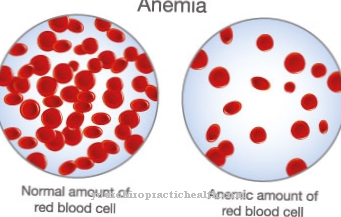As Asperger syndrome is a developmental disorder that belongs to the spectrum of autistic diseases. Asperger's syndrome is associated with impaired social interaction and recurring behavioral patterns. As the causes of the disease have not yet been clarified, Asperger's syndrome is considered incurable.
What is Asperger's Syndrome?

© Photographee.eu - stock.adobe.com
Asperger's syndrome is a developmental disorder that is often compared to mildly pronounced autism and is characterized by disorders in social and communicative interaction despite a normally developed intelligence.
As a rule, those affected by Asperger's Syndrome have a limited ability to empathize (empathy) and are noticeable through inappropriate social behavior. This is due to the fact that verbal and non-verbal signs of human communication cannot be interpreted by those affected by Asperger's Syndrome. You can neither interpret irony nor sarcasm nor facial expressions or gestures of the other person.
Unconventional interests and preferences (memorization of certain data) that appear to be abnormal to outsiders in terms of intensity and content, as well as repetitive, almost ritualized behavior patterns from which those affected find it difficult to detach, are characteristic symptoms of Asperger's syndrome.
causes
To date, the causes of Asperger's syndrome have not been adequately clarified. It is believed that Asperger's Syndrome is largely genetic. Furthermore, disorders in the development of neuronal structures are suspected, which cause incorrect information processing of complex relationships (central coherence).
In addition, neurophysiological impairments in Asperger's syndrome lead to disorders of fine and sensorimotor functions, limit visual-spatial perception and non-verbal categorization. This is partly attributed to a reduced activity observed in those affected in specific areas of the prefrontal cortex (part of the cerebral cortex belonging to the frontal lobe).
The amygdala (almond kernel), which as part of the limbic system is essential for the emotional assessment and assignment of situation contexts, shows anomalies in those affected by Asperger's Syndrome. In contrast, non-somatic (trauma) and socialization-related causes (upbringing) are ignored.
Symptoms, ailments & signs
People with Asperger's Syndrome have trouble putting themselves in other people's shoes. They cannot correctly interpret the tone of voice, facial expressions and gestures of their counterpart. They are mostly intelligent and articulate above average. Asperger's children begin to speak before they can walk. Her tone of voice is monotonous and her facial expressions hardly exist. A fixed and regular daily routine is important to them.
Children have difficulty making friends and are often angry. Their physical coordination is clumsy to poor and their posture is noticeable. They have poor control over their emotions and are sensitive to touch, sounds, and smells. People who have Asperger's Syndrome are considered perfectionists, love attention to detail and are overly precise in their actions.
You develop preferences and a strong interest in certain things and deal with them intensively. Some people learn timetables by heart or are fascinated by the history and its dates. They appear arrogant and impolite to others and are honest in every situation. Asperger's syndromes are similar to the symptoms of autistic people, but differ significantly in the entirety of the disease. Asperger's syndrome is only noticed in kindergarten age and autism in toddler age.
Diagnosis & course
For a reliable diagnosis of Asperger's Syndrome, diseases with similar symptoms (early childhood autism, ADHD, obsessive-compulsive disorder) should be excluded in advance. In Asperger's syndrome, in contrast to early childhood autism, the first symptoms are usually only visible after the age of three, when social integration skills are required of the child (e.g. when entering kindergarten).
To diagnose Asperger's syndrome, a psychiatrist determines the cognitive and social development status of the person concerned, taking into account the previous history and with the aid of specific characteristic and evaluation scales, and tries to determine characteristic behavioral abnormalities by observing.
In adults, special questionnaires are used and childhood is examined more closely, as behavioral problems can best be observed in this phase of life. Ideally, people from the socialization context (parents, siblings) are also interviewed. Asperger's syndrome has a chronic course, although the individual deficits can be alleviated by psychological support for those affected by Asperger's syndrome.
Complications
Asperger's syndrome is congenital and mostly affects children of the male sex. The resulting complications depend on the respective use of various therapeutic measures. These differ from case to case and vary with age.
The underlying problems are often a greater stress test for the parents or the caregiver than for the child itself. The first symptoms of Asperger's are seen in children between the ages of one and three when they are learning to speak. They either articulate or they don't. Asperger's children often appear closed and have contact difficulties.
The person concerned remains related to himself for the rest of his life. His individual behavior can result in complications in school and in adult life. At times this self-isolation can end in depression. In some cases, Asperger's sufferers become care cases who cannot integrate into society in general or at work.
The child's impairment increases negatively if parents forego a medical diagnosis. School problems then result from the hyperactive and rough behavior, which is why these children with ADHD are stigmatized and treated incorrectly if the findings are not made. Asperger's children, however, have an above-average intelligence. If the diagnosis is made early, the child can develop their talents to the full, despite the deficit.
When should you go to the doctor?
If you suspect Asperger's syndrome, you should definitely seek advice from a doctor. A diagnosis of the developmental disorder can almost always make life easier for those affected - be it through various therapeutic measures or through appropriate medication. Anyone who notices symptoms of Asperger's Syndrome in their child should definitely seek medical help. Depending on the severity of the disorder, untreated Asperger's Syndrome can cause major problems in everyday life and at work.
A medical examination is particularly recommended if the impairments cause the person concerned to suffer. Medical or therapeutic advice is required at the latest when Asperger's Syndrome leads to behavior that is harmful to oneself or others. However, the person concerned must be ready for this, which is why it is advisable to talk to them beforehand.
Children who may have Asperger's Syndrome should be well prepared for a doctor's visit and treatment. Parents and acquaintances should use information brochures, forums and discussions with doctors and therapists to find out about the syndrome and how to deal with it before finally venturing to see a doctor.
Doctors & therapists in your area
Treatment & Therape
As the disease is incurable, therapy for Asperger's Syndrome aims to reduce individual deficits and promote existing skills. It depends on the severity of the symptoms.
Sufferers with mild Asperger's syndrome do not necessarily have to be treated therapeutically and are often able to integrate themselves socially and professionally. In contrast, in the case of pronounced Asperger's syndrome, long-term therapy should be started at an early stage. In this context, rules of conduct for everyday life are learned with the help of different therapy concepts and attempts are made to reduce compulsive and ritualized behavior.
As part of an ABA (Applied Behavior Analysis) program and small talk training, socially adapted behavioral patterns are practiced through constant repetition. Through the TEACCH program (Treatment and Education of Autistic and related Communication handicapped Children), those affected by Asperger's Syndrome are encouraged to process and acquire new learning content by preparing it according to their individual interests and existing skills.
Drug therapy does not correspond to the rule in Asperger's syndrome and is mostly only used when other disorders (ADHD) occur.
Outlook & forecast
In contrast to early childhood autism, there is too little long-term knowledge in Asperger's syndrome to realistically assess the long-term development of those affected. Experts observe a relatively stable development with a tendency for the symptoms to improve over the course of the biography. Asperger's syndrome is not curable, however, the characteristic symptoms remain throughout life.
However, some of those affected manage to have a stable couple relationship or other stable social relationships despite their social limitations. Professionally, they can find fulfillment if the professional requirements match their interests. Many Asperger's autistic people succeed in computer science professions, where they are not forced to be in constant social contact with other people.
Even if they often appear hypothermic and self-centered, that doesn't mean they don't have feelings. Most Asperger's autistics do not seek treatment, they rather want those around them to accept them with their limitations. It depends very much on the individual living conditions of those affected and the acceptance by their social environment, whether they feel comfortable and can lead a fulfilling life despite their limitations. If they find it bothersome, depression can develop too. A general forecast is difficult because the forecast depends on individual factors.
prevention
Even though there are no preventive measures for Asperger's syndrome, an early diagnosis and an early start of therapy can ensure better treatment success and help avoid secondary diseases (depression). In addition, the success of the therapy depends on the willingness of the social environment to integrate and the care options available for those affected by Asperger's syndrome.
Aftercare
Since Asperger's syndrome, like all disorders of the autism spectrum, is a lifelong, congenital, psychological disability, there is never a real conclusion or even a cure. Depending on the patient, a single therapy can be enough to cope with everyday life with little or no support. It is equally possible that lifelong support will be needed.
The follow-up care that follows autism-specific psychotherapy usually consists of outpatient care in the form of outpatient assisted living or accommodation in a dormitory specializing in autism or in a shared flat with all-day care. Because the main difficulty for Asperger's autists lies in the social interaction with non-autistic, i.e. neurotypical, this is where they most likely need support.
Where therapy can only play through theoretical scenarios, assisted living offers the possibility of accompanying the everyday life of an autistic person and providing support where the problems arise. Precisely because many autistic people are unable to work, there are many vitally important official visits and visits to the doctor, which require accompaniment. In some cases it can make sense to hire a legal representative, because this takes the pressure off the patient to be responsible for securing a livelihood.
You can do that yourself
The most important thing in everyday life for a person with Asperger's Syndrome is structure. Fixed plans and rules relieve you of the pressure of having to make quick decisions under sensory overload and give you the necessary security to tackle everyday tasks.
First of all, your personal strengths and weaknesses should be analyzed. Which situations are perceived as particularly overwhelming? What activities to be calming? On this basis, daily and weekly plans can then be drawn up, which are not about completely avoiding exciting situations. The aim is to find a balance between the stressful activities and periods of rest, in which the tension can be relieved again.
Another important strategy is the conscious study and learning of social behavior. Those affected find it difficult to interpret the facial expressions and gestures of the other person and to react appropriately themselves. Many social processes are constant and can be practiced in role play. These exercises do not have to be done as part of behavior therapy or a special course. Family, friends, and partners can help as well.
There are now a number of apps for smartphones that make communication easier. Using picture cards and sentence modules, they help to formulate sentences even when speaking is particularly difficult.


.jpg)



.jpg)




















